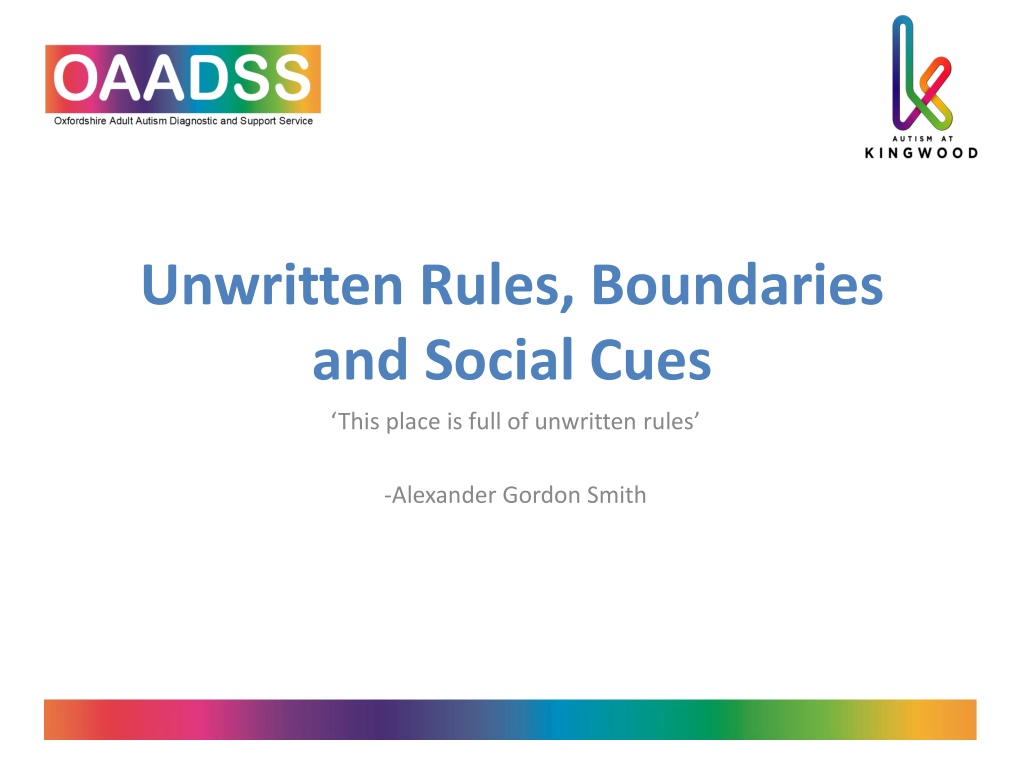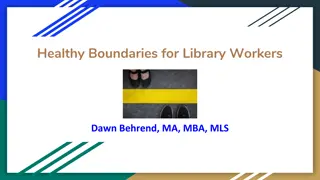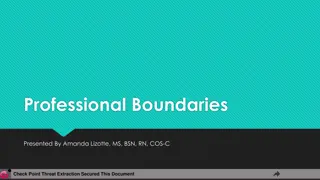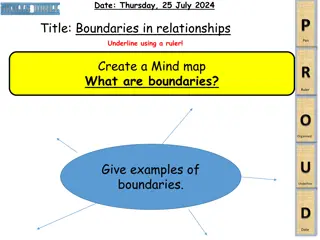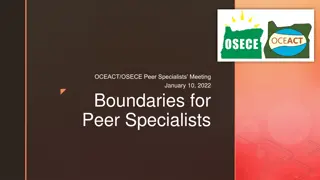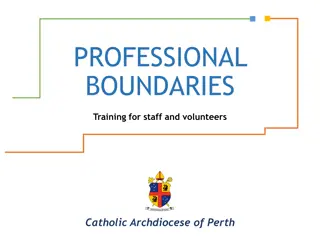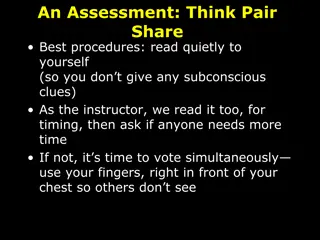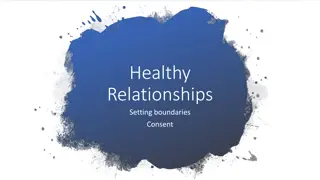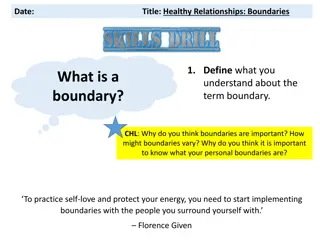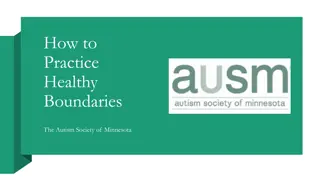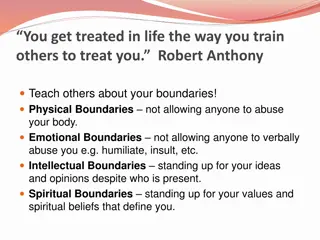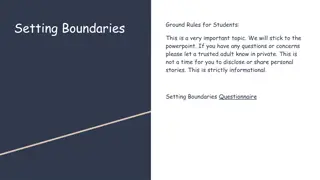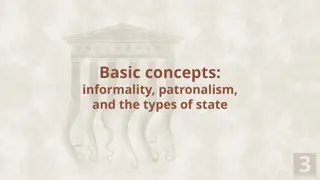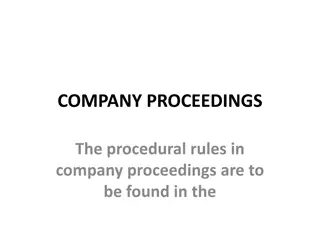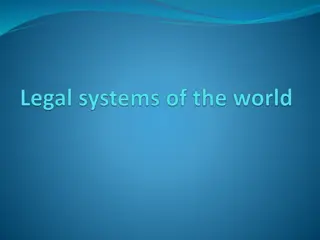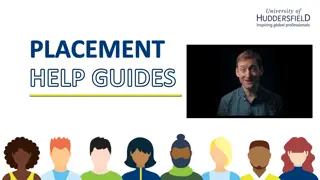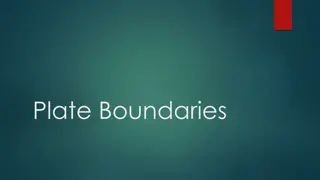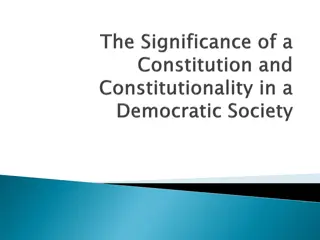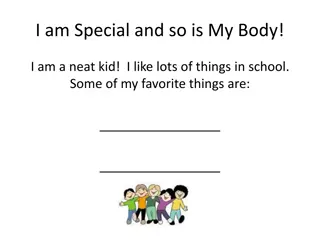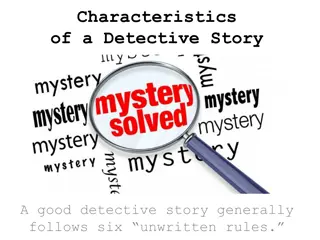Understanding Unwritten Social Rules and Boundaries
Navigating social interactions can be challenging due to the abundance of unwritten rules and social cues. From greeting politely to taking turns in conversation and showing empathy, following these unspoken guidelines is crucial for smooth communication and relationships. Understanding and respecting boundaries, being mindful of others' emotions, and cooperating with those around you are key components in successful social interactions.
Download Presentation

Please find below an Image/Link to download the presentation.
The content on the website is provided AS IS for your information and personal use only. It may not be sold, licensed, or shared on other websites without obtaining consent from the author. Download presentation by click this link. If you encounter any issues during the download, it is possible that the publisher has removed the file from their server.
E N D
Presentation Transcript
Unwritten Rules, Boundaries and Social Cues This place is full of unwritten rules -Alexander Gordon Smith
The World A Confusing Place As you have probably noticed, the world can be a confusing place for people with social processing difficulties. There are so many unwritten rules, that we as a society are expected to follow; and these are not written down for us to read and follow we are just expected to learn them, follow them and know them.
Social Rule #1 Meet and greet politely We are expected to greet people with a hello or nice to meet you when we first see them. We politely offer compliments, and receive them gratefully a that s very kind of you or a thank you would suffice. We are also expected to finish a conversation with a see you later or it was lovely speaking to you , rather than just walking off when you are finished conversing.
Social Rule #2 Take turns talking Conversation is a two way thing. Imagine a game of tennis it would not work if the ball wasn t being hit back and forth by both individuals. It s the same with talking. Look the individual in the eye, try not to interrupt (wait for the end of a paragraph to speak), and respond appropriately (with something related to what the other person is saying).
Social Rule #3 Pay attention to others Stop what you are doing so you can focus on listening to the individual. You are expected to read their emotions through their body language and facial expressions (we will look at this later on), and change your behaviour to match what the other person is doing For example, if someone is sad, you are expected to be quieter, acknowledge this and offer gentle reassurance.
Social Rule #4 Think about others before acting Don t touch people without asking or gaging that it s OK to. If someone is upset and crying, you could say to them I would like to give you a hug. Would that be OK? You are expected to queue and be mindful of people who are waiting to be served you should not cut in line, as others have got there earlier and are waiting. You need to ensure you wait your turn
Social Rule #5 Cooperate with others It is an unwritten rule, that socially you should follow directions when you re asked to and ask for help when you need it. (of course, you would not follow directions if you were told to do something dangerous or unpleasant to others). You should apologize when necessary (when you get someone's name wrong or burp in public, for example) and should be open to new ideas.
Why Follow Social Rules? If you don t follow social rules: Others may think you are uncaring or self-centred Others may find your behaviour annoying and avoid you You may be left out of activities or groups You may be bullied or viewed as being disrespectful or rude
Unwritten Rules to Follow Keep your phone away if someone is talking to you Do not talk on the phone in the cinema or in quiet public spaces (such as the library) Do not ignore people during dinner or when dating, or text other people If you are at someone's house and they say I have a lot on at work tomorrow , I m getting tired , or It s getting late , it means it s time to leave now. You can say I m going to have to get off now. It was lovely seeing you. I ll see you soon .
Unwritten Rules to Follow Keep your mouth closed when chewing (no one wants to be covered in partially chewed food) this also means no talking while chewing If you get a lift with someone, you should offer to pay something towards the petrol Don t make plans with people if other people who aren t invited are present Hold the door open if there is someone slightly behind you don t close it in their face Let people leave from trains, buses and elevators before you go in.
Unwritten Rules to Follow Though you are entitled to have your opinion, it s not always appropriate to share it Watch where you are going when you are walking and try not to stop in someone else's way Don t cut someone off when they are talking wait until they finish speaking Don t share too much try not to speak about sex, bad things you have done, your health and relationship problems with people you have just met
Unwritten Rules to Follow Don t criticize people who haven t asked you to do so, and if you are criticizing someone (for example, they have asked for feedback on a CV), be careful as to how much negative feedback to give the best way to do this is to sandwich it: Start with a positive comment Then give a negative including how to improve it Finish with a positive
Unwritten Rules to Follow Avoid talking about religion and politics people may differ in opinion No means no Bring a gift when visiting someone s home and don t insult the hosts Don t start eating until everyone at your table has been served You should offer friends help cleaning up after a party Don t brag about your financial situation Make sure you queue
Practical Practical activity- Card matching How good are you at matching feelings to senarios
Video Time https://www.youtube.com/watch?v=ORR_o4CO NpY
Reading Facial Expression Practical Activity how good are you at reading facial expression How do we use facial expressions? We use them to express how we re feeling. We raise our eyebrows when questioning something, smile when we are happy and sulk when we are angry Why do they matter? We can appear rude if we read facial expressions wrong, and can give people the wrong impression
Body Language Sometimes, emotions are so strong, it changes the way we carry our body We slump our shoulders when tired We shrug when we don t know an answer We add a skip in our step when we are happy Body language is an important way of communicating and people can get annoyed if their body language is ignored.
Personal Space and Boundaries If we like someone, we tend to stand closer to them than we would someone we have only just met or don t like. Standing too close, or too far from someone can be awkward. Think of your personal space as an invisible bubble around you which other people can t get inside.
Conclusion The world is a very confusing place There are many unwritten rules and expectations for us to follow, and yet most neurotypicals understand them It is harder for people with ASD to understand the unwritten rules If you learn the rules in this workshop, you should find the world a little more pleasant
